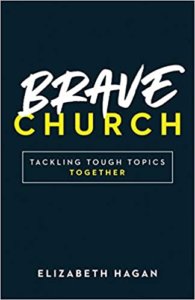Are certain topics off limits in your church? If so, people may feel their real-life problems and concerns simply aren’t welcome in the church. Elizabeth Hagan suggests five rules for engaging tough topics bravely, honestly and openly.
I grew up in a church that never felt real. We talked about God, Jesus, and facts of Bible stories. We talked about Christmas pageants, bake sales, and chili suppers. But we never talked about the parts of life that made us sad, scared, angry, or ashamed. We checked our heartaches and our messy, complicated lives at the church door.
In too many churches, unspoken rules about what can and cannot be discussed keep us from ministering to people’s real-life problems. Subjects like domestic violence, divorce, infertility, sexuality, racism, and mental illness are taboo. And we end up pushing away those who receive the message that their struggles aren’t welcome in church. But what if our churches could instead be places of authentic, honest conversation? What if we cared about people’s worst moments as much as their best, as Jesus did?
From safe space to brave church
The phrase “safe spaces” came into use in the mid-20th century to describe a place of emotional and spiritual support for people who feel their values, identity, or expressed boundaries have been violated. We all need safe spaces, especially marginalized populations. Gathered in a safe space, like-minded people can freely be themselves. But in a safe space it’s all too easy to sink into the safety of the familiar. We forget how to listen to new perspectives.
Brian Arao and Kristi Clemens, two student affairs educators at New York University, have suggested a better environment for dealing with tough topics — a “brave space” that allows participants to listen to one another and learn from challenges. (“From Safe Spaces to Brave Spaces,” The Art of Effective Facilitation, Stylus Publishing, 2013.) Drawing on their work, I believe a new set of rules can help your church move from being a safe space to a brave church willing to take on tough subjects.
1. Accept conflict and commit to the way of kindness.
“Let’s just agree to disagree” is a common rule for safe spaces. But it can end conversations in our churches. If we want to have conversations about real life in church, we will experience moments of conflict and controversy. Brave churches accept conflict and commit to the way of kindness. We do not avoid or ignore controversial ideas. We do not respond to disagreements by ending the conversation. Nor do we approach conflict as a debate that can be won. We listen. We consider the tone of our voice, and we keep talking with one another. We remember that we are all children of God. Brave churches believe that we can share space with people with whom we disagree. Brave churches believe that by exploring the roots of our disagreement and staying in conversation, we can strengthen our community of faith.
2. Take responsibility for how your words are received.
“Don’t take things personally.” This safe space mantra asks us to set aside our judgments and emotional responses. In tough conversations, the rule can encourage greater participation and honesty as it frees participants from the fear that they will be labeled (for example, sexist, racist, homophobic). For instance, when we are worried a comment will offend someone, we might say, “Now, don’t take this the wrong way, but ….” The phrase acts as a disclaimer, letting us off the hook for any hurt feelings or anger our words might cause.
Brave churches recognize that words can cause harm, and we take responsibility for how our words are received. We recognize that we are all imperfect and that we may say sexist, racist, patriarchal, homophobic, or otherwise hurtful things. Brave churches know these mistakes do not make us bad people but rather people whose words have caused harm. When we hurt other people, intentionally or unintentionally, we have a chance to repair the damage. Brave churches humbly acknowledge mistakes and pledge to keep learning.
3. Ask permission before challenging someone’s views on a subject.
When we embrace our churches wholly as safe spaces, we often come to believe that we should always be comfortable in church. When a controversial topic or uncomfortable subject emerges, we stay quiet. We keep the peace. We hold our tongues out of respect for the comfort of others in the room. Yet maintaining that comfort comes with a price. It limits the conversations we are able to have. It silences voices of dissent and expressions of pain. It shuts down challenges that might lead to new growth.
Brave churches, in contrast, set aside comfort for the good of challenging the norm. We believe we can grow from challenges posed to our current ways of thinking. We believe engaging in these tough conversations can allow us to see God in new ways. But here is the key: To honor the boundaries of our group members, we ask permission before we challenge one another. We accept that some participants may not be up for a challenge in the moment.
4. Graciously receive feedback if someone feels disrespected.
Respect is a rule everyone can agree on. In safe spaces, group members might pledge to honor each person’s point of view — a noble intention of humility. In brave spaces, we must consider what respect actually means to each group member because it can mean different things to different people. Brave churches show respect by learning what respect means to each person. How would group members like to be addressed, for example. As brave churches, we are willing to learn from one another and change our habits in an effort to show respect to everyone in our community. We know that we may falter and agree to graciously receive feedback if our words have hurt someone in the group.
5. Use “I” instead of “you” statements. Do not accuse or attack.
A rule of both safe spaces and brave spaces is “no attacks” — no name calling or hateful challenges to someone’s identity. While we may disagree about these tough topics, we do not make personal attacks. We do not call people names or accuse one another. Brave churches do, however, challenge ideas. If I’ve received verbal consent, I can challenge your idea. I might tell you how I perceive your idea, how it makes me feel, or why I believe it needs further explanation. When we challenge ideas, we make “I” statements. We ask earnest questions to make sure we hear and understand one another. Brave churches invite group members to critically examine their ideas and to consider new perspectives — not to declare one right and another wrong but to keep learning in community.
It requires an act of courage to step beyond the comfort we find in our shared Christian faith and to engage in hard conversations about real life. Brave space discussions demand a lot from people, especially from those who do not share the dominant viewpoint. But tough conversations are worth the effort. Talking about real life can transform our churches. When we can really hear people’s stories, even when they make us uncomfortable or challenges us in some way, we live into our true Christian identity.
This excerpt has been edited and condensed to include content from the introduction and chapter 1 of Brave Church: Tackling Tough Topics Together by Elizabeth Hagan. Copyright © 2021. Used by permission of Upper Room Books (upperroombooks.com). The book is available at Cokesbury and Amazon.
Related Resources
- 5 Ground Rules for Candid Conversations by Tom Berlin
- Difficult Conversations by Olu Brown








